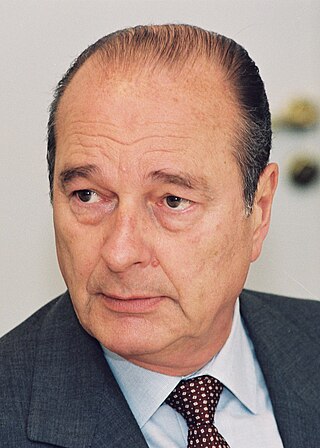
Jacques René Chirac was a French politician who served as President of France from 1995 to 2007. He was previously Prime Minister of France from 1974 to 1976 and 1986 to 1988, as well as Mayor of Paris from 1977 to 1995.

Robert Denard was a French mercenary. He served as the de facto military leader of the Comoros twice with him first serving from 13 May 1978 to 15 December 1989 and again briefly from the 28th of September to the 5th of October in 1995. Sometimes known under the aliases Gilbert Bourgeaud and Saïd Mustapha Mhadjou, he was known for having performed various jobs in support of Françafrique—France's sphere of influence in its former colonies in Africa—for Jacques Foccart, co-ordinator of President Charles de Gaulle's African policy.

Gaullism is a French political stance based on the thought and action of World War II French Resistance leader Charles de Gaulle, who would become the founding President of the Fifth French Republic. De Gaulle withdrew French forces from the NATO Command Structure, forced the removal of Allied bases from France, as well as initiated France's own independent nuclear deterrent programme. His actions were predicated on the view that France would not be subordinate to other nations.

The Rally for the Republic was a Gaullist and conservative political party in France. Originating from the Union of Democrats for the Republic (UDR), it was founded by Jacques Chirac in 1976 and presented itself as the heir of Gaullist politics. It was one of the two major parties in French politics, alongside the Socialist Party. On 21 September 2002, the RPR was merged into the Union for the Presidential Majority, later renamed the Union for a Popular Movement (UMP).
The Service de documentation extérieure et de contre-espionnage, abbreviated SDECE, was France's external intelligence agency from 6 November 1944 to 2 April 1982, when it was replaced by the Directorate-General for External Security (DGSE). It should not be confused with the Deuxième Bureau which was intended to pursue purely military intelligence.
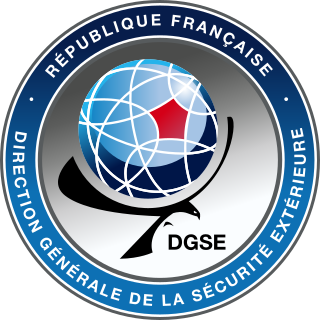
The Directorate-General for External Security is France's foreign intelligence agency, equivalent to the British MI6 and the American CIA, established on 2 April 1982. The DGSE safeguards French national security through intelligence gathering and conducting paramilitary and counterintelligence operations abroad, as well as economic espionage. It is headquartered in the 20th arrondissement of Paris.
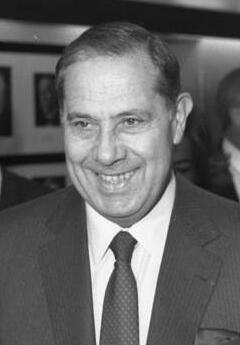
Charles Victor Pasqua was a French businessman and Gaullist politician. He was Interior Minister from 1986 to 1988, under Jacques Chirac's cohabitation government, and also from 1993 to 1995, under the government of Edouard Balladur.

The SAC, officially created in January 1960, was a Gaullist militia founded by Jacques Foccart, Charles de Gaulle's chief adviser for African matters, and Pierre Debizet, a former Resistant and official director of the group. Important members included Charles Pasqua, part of the Gaullist movement and known as Jacques Chirac's mentor, Etienne Léandri, a friend of Pasqua, Robert Pandraud or Christian Fouchet. The predecessor of the SAC was the service of order of the Rassemblement du Peuple Français (RPF) Gaullist party. The SAC was dissolved in 1982 under François Mitterrand's government, after a particularly gruesome multiple murder triggered by internal rivalries.

Jacques Foccart was a French businessman and politician, best known as a chief adviser to French presidents on African affairs. He also co-founded in 1959 with Charles Pasqua the Gaullist Service d'Action Civique (SAC), which specialized in covert operations in Africa.
Michel Roussin was the chief of staff of Alexandre de Marenches, who directed the SDECE French secret service until the May 1981 election of François Mitterrand as President of France. Michel Roussin has also been chief of staff of Jacques Chirac when he was mayor of Paris and also when he was prime minister.
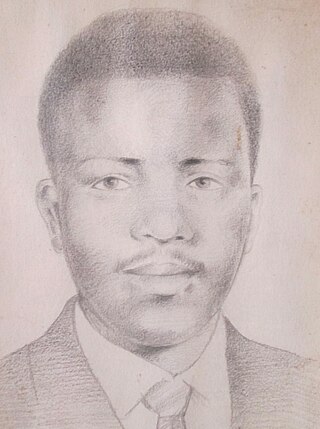
Félix-Roland Moumié was an anti-colonialist Cameroonian leader, assassinated in Geneva on 3 November 1960 by an agent of the SDECE with thallium, following official independence from France earlier that year. Félix-Roland Moumié succeeded Ruben Um Nyobé, who was killed in September 1958, as leader of the Union des Populations du Cameroun.
Jean-Charles Brisard is a French international consultant and expert on terrorism.
The Mitterrand–Pasqua affair, also known informally as Angolagate, was an international political scandal over the secret sale and shipment of arms from Central Europe to the government of Angola by the Government of France in the 1990s. The scandal has been tied to several prominent figures in French politics.
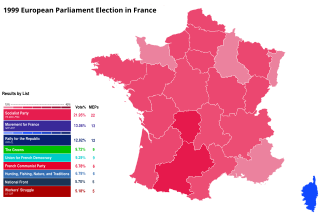
European Parliament elections were held in France on 13 June 1999. Once again, abstention was very high for this type of election- only 47% of eligible voters voted. The election was also the first French European election to be won by the Socialist Party (PS).
Major General Smain Lamari was the head of an Algerian intelligence service, the Department of Counter-Espionage and Internal Security.
The Bureau Central de Renseignements et d'Action, abbreviated BCRA, was the World War II-era forerunner of the SDECE and DGSE, the French intelligence services. It was created by Charles de Gaulle in 1940 as a Free French intelligence system that combined both military and political roles, including covert operations, though this policy was reversed in 1943 by Emmanuel d'Astrier (1900-69), who insisted on civilian control of political intelligence. The Bureau was first commanded by Major André Dewavrin, who had taken the nom de guerre "Colonel Passy", while journalist Pierre Brossolette (1903-44) headed the civilian-arm.
While the CIA cooperates with its French counterpart, the DGSE, the countries do collect information on one another, especially in the economic and scientific areas.
The Action Division, commonly known by its predecessor's title Action Service is a division of France's Directorate-General for External Security (DGSE) responsible for planning and performing clandestine and covert operations including black operations. The core specialisations of the Action Division are sabotage, destruction of materiel, assassination, detaining/kidnapping, interrogation with and without using torture, infiltration/exfiltration of persons into/from hostile territory and hostage rescue.

Jean-Yves Ollivier is a French businessman who works primarily in the commodities sector in emerging markets.











